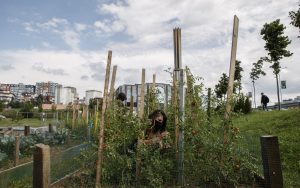Today is a day to reflect on our collective actions and efforts to end world hunger, writes in his op-ed for Prishtina Insight, the FAO Regional Representative for Central Europe and Asia, Vladimir Olegovich Rakhmanin.
Every year on 16 October, the observance of World Food Day is led by the Food and Agriculture Organization of the United Nations (FAO). It is a day to reflect on what we can do, collectively, to end hunger. It is a day for us to work for the 3.1 billion people around the world who cannot afford a healthy diet and the 828 million people who go to bed hungry each day. It is a day to decide what can be done to end the famine and malnutrition that are leading to loss of lives and putting at risk a healthy future for our children – globally, as well as in Europe and Central Asia.
Collectively, we need to empower the most vulnerable, including smallholder producers, by investing in agrifood systems
Although we have made progress towards building a better world, progress has slowed down recently. The world has faced many global crises in the past two years that resulted in too many people being left behind.
The COVID-19 pandemic, extreme weather events disrupting food production, rising food and energy prices and conflicts have affected our region, too. Hunger and malnutrition are rising and more people are falling into poverty.
It is time, now more than ever, for us to work together to build a new era of hope, for everyone, everywhere.
We must take actions to ensure that everyone has access to safe, affordable and nutritious food at all times. But we must act together. Lasting change can only come from concerted, determined collective action.

A Termokiss volunteer works on the Bread for All project at their vegetable garden in Pristina, Kosovo, 25 August 2020 (issued 02 September 2020). Bread for All is a project of the Termokiss, a community-run center, volunteers that aims to prepare and distribute food to the homeless and vulnerable on the streets of Pristina during the SARS-CoV-2 outbreak. Photo: EPA-EFE/VALDRIN XHEMAJ
One important and pervasive shift that FAO is leading is that of transforming food systems and facilitating market access and integration. This initiative will work to transform food systems to be more efficient, more inclusive, more resilient and more sustainable, for better production, better nutrition, a better environment and a better life for all.
Our agrifood systems hold great potential for a more equitable and prosperous future, as they are interlinked to many areas of our lives and economy – from agriculture to natural resources, to energy, to health to name a few.
Here in Europe and Central Asia, the sustainable development of agrifood systems is affected by the socio-political transitions underway. In the region, FAO is supporting the development of national and regional trade policies to create more sustainable agrifood systems.
But to achieve this goal we must act as a global society. We need to support countries at risk of hunger, malnutrition and famine, helping them to transform agrifood systems, funding humanitarian appeals and boosting resilience.
Greater priority must be given to increasing local nutritious food production, preserving natural resources and to valorizing local traditions and culturally significant land and agroecosystems maintained by farmers with traditional knowledge.
Collectively, we need to empower the most vulnerable, including smallholder producers, by investing in agrifood systems. This means finding ways to offer improved access to training, incentives, science, data, technology and innovation, putting smallholders at the center of this transformation.
Innovation and digitalization of agriculture can accelerate achieving better livelihoods for smallholder farmers by giving them access to important local information, such as on weather, soil conditions, irrigation, recovery with insurance after such events as flooding, local market prices for crops and pest control.
In Europe and Central Asia under the regional initiative to empower smallholders, family farms and youth, FAO is supporting the development of digitally skilled rural communities.
The goal is to help smallholders gain diversification of incomes and can enable both on- and off-farm employment and business opportunities for today and the future.

A woman kneads an arepa during the World Arepa Day, in Caracas, Venezuela, 10 September 2022. More than 400 children gathered at a sports field in Petare, the largest favela in Venezuela, to taste the ‘favorite breakfast of Venezuelans’, the Arepa, on its ‘World Day’ celebration. Photo: EPA-EFE/MIGUEL GUTIERREZ
Decent employment is fundamental to human dignity. We need decent rural employment and services, while fostering gender equality and supporting rural communities.
At the same time, governments need to provide timely and well-targeted social protection programmes that protect the most fragile.
Let this World Food Day be a reminder of the need to accelerate these efforts, and strive for a future where no one is left behind, and where everyone has access to healthy and affordable food.
Vladimir Olegovich Rakhmanin is the Food and Agriculture Organization Assistant Director-General and Regional Representative for Europe and Central Asia. He took office in January 2014.
The opinions expressed in the opinion section are those of the authors only and do not necessarily reflect the views of Prishtina Insight.





